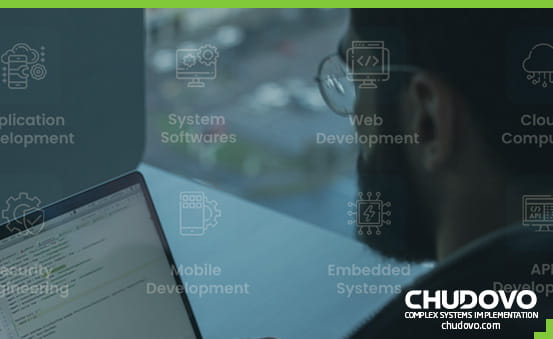Blockchain-as-a-Service – How It Works, Who Provides It, and What to Do With It
Table of contents
Blockchain has come a long way from a breakthrough concept to an advanced technological foundation used across industries and niches. With crypto and blockchain harnessing a $6.6 billion-worth global market sector, it is one of the most rapidly self-popularized technologies in history.
The emergence of the Blockchain-as-a-Service model was only a question of time. So many companies and entrepreneurs are eager to indulge in the ultimate benefits of blockchain. An ability to adopt it without having to bother with all the infrastructure development and performance management stuff is in obvious demand.
But let’s go deeper – how does BaaS work, what is its place in today’s IT market, and how is it commonly used in practice? We figure out this and more in the following overview.
What Exactly is Blockchain-as-a-Service?
You just may already be familiar with the Software-as-a-Service (SaaS) model. Instead of selling a huge piece (or a whole ecosystem) of complex, expensive software infrastructure, vendors provide access to a certain solution through a paid subscription.
Such solutions are hosted in the cloud, so end users do not even have to install anything while it is the vendor’s job to keep the software running, maintain its cybersecurity, updates, etc. Users are focused on their thing while the provider maintains the tech – a win-win.
Hopping up on the bandwagon, vendors were quick to start providing all sorts of solutions by the cloud subscription principle, including platforms (PaaS), infrastructures (IaaS), desktops (DaaS), and more. The BaaS abbreviation has joined the parade just recently.
Going for a Blockchain-as-a-Service solution, you get a readymade tech foundation and infrastructure hosted by your BaaS vendor. You sort of rent existing blockchain capacities, paying only for the setup and maintenance of system nodes. The rest is up to you – you get full control of the hosted blockchain infrastructure and are free to build blockchain networks, integrate with all kinds of services, and scale however you see fit.
An important benefit
We have to mention that the BaaS model brings about a global benefit of introducing the “accessible blockchain” to broad user audiences, proving that anybody can use the technology nowadays. The days when you needed to invest in specialized hardware stacks are gone, and BaaS seems like the last tier before the “everyday blockchain use”.
And for businesses, projects, and startups, this means the availability of cost-efficient blockchain opportunities no matter the scale of your company or the size of your team. You get a great chance to build new blockchain apps based on capacities that don’t burn a hole in your pocket.
Why Do We Need BaaS?
Data drives any modern organization’s activities. That is why we focus so much on soaking up relevant information before others do and value its quality and integrity. Blockchain makes a perfect tool for supplying such information. It delivers instantaneous, shareable, and transparent data recorded on an unchangeable ledger that can only be viewed by members of the permission network.
Payments, orders, user accounts, production cycles, and much more can be tracked via blockchain networks. Their members may examine all transaction data in one place, eliminating tons of routine and gaining better confidence in underlying operations.
To indulge in all that convenience, though, one has to first overcome a scope of related challenges. The major of which include
- inherent technical complexity
- overhead costs of operations in the field
- insufficient domain expertise that can be scarcely found in your local labor market
BaaS comes into play to solve all of the above and streamline blockchain applications further.

Certified engineers
Convenient rates
Fast start
Profitable conditions
Agreement with
EU company
English and German
speaking engineers
Bringing DTL Ever Closer to the Public
With the emergence of BaaS, we can safely say that Distributed Ledger Technology (DLT) has never been this close to widespread public use. And it becomes more accessible by the day with more and more new BaaS providers inhabiting the global market (making good competition for Oracle, Amazon, IBM, and Microsoft).
From getting a boost in enterprise interoperability through firmly protected solutions for data sharing to the creation of custom blockchain solutions. Let’s take a look at some particular cloud-based blockchain platforms you can already subscribe to in order to do all that and more without going far or paying too much.
Dragonchain
Initially a Disney’s department, Dragonchain has come to be one of the busiest providers of BaaS platform opportunities out there. Company’s main priority is the security of vital business data and assets based on the serverless cloud architecture. The offered opportunities allow enterprises to reinforce the way they share essential data (e.g., related to finances).
Blockstream
The guys at Blockstream are focused on helping clients to start working with the Bitcoin ecosystem and related protocols. They provide a foundation for building scalable Bitcoin solutions with a specialized crypto processing system that allows creating extensive peer-to-peer payment systems free from any third parties. Which may as well be the “golden ticket” to the land of cryptocurrency for many startups and up-and-coming companies out there.
Amazon Web Services
Surely, you have more than heard about this suite of cloud solutions. Today, AWS managed blockchain serves industry giants like PwC and T-Mobile to satisfy their DLT needs. A great selling point here is the versatile ability to integrate an extensive range of tools, processes, and networks run by a reliable vendor that is not going anywhere. In particular, you get flexible integration opportunities backed by Hyperledger Fabric and Ethereum.
BlockApps
Now these guys offer a readymade blockchain environment where nodes may be instantly launched either on the cloud or locally – totally your choice. The range of applications for the underlying platform is pretty wide, the company’s portfolio has anything from ticketing fraud prevention solutions to smart insurance contracts.
Cryptowerk
The company employs an authentic Cryptowerk Seal API to help you literally seal off the enterprise data through a ledger that stands on the guard of digital assets and data authenticity. Basically, all sorts of data can be secured by subscribing (Cryptowerk’s field practice includes protecting ID codes for shipments and GPS telemetry gathered from car fleets).
Azure
This list would not be complete without the Microsoft Azure Blockchain-as-a-Service, a DLT environment by a very familiar vendor. Microsoft employs a specialized Blockchain Workbench to help clients run decentralized apps and achieve unique results without bothering with infrastructure and networks setup. You get automated ledger deployment, pre-built blockchain commands, and more to establish a sturdy protected digital environment.
PayStand
BaaS by PayStand is all about the protection and transparency of payments, as well as flexible documentation of all underlying processes. You can easily subscribe to a decentralized network that can notarize various certificates (e.g., receipts or diplomas) and get an admin dashboard for simple real-time data monitoring and in-depth reach into assets (e.g., for thorough audits). Add a good dose of end-to-end financial process automation, and you got yourself a reliable BaaS partner.
All in all, BaaS is a highly available service nowadays, and you certainly should not fret when deciding to go for it or considering it a “still-to-mature” tech format.
Picking a BaaS Subscription – What Factors to Consider?
As with any enterprise solution, we pick a fitting BaaS vendor (and platform functionality) based on a bunch of business requirements. The final choice will be a lot easier, however, if you know what common top priorities to pay attention to. Here is what you should figure out to really hit the spot.
- Smart contracts and the way they integrate
In blockchain-powered solutions, your business logic rests on a smart contract mechanism. Smart contracts pack all the rules, permissions, and penalties in terms of all decentralized operations. And as complex as they may be in work, you need a vendor that would help you easily integrate and deploy smart contracts matching your scale of business performance. - Supported frameworks, runtimes, etc.
Not all BaaS vendors work with a range of underlying building tools and blockchain deployment scenarios. This is where you should clarify for yourself – “is there a chance that I would have to switch to a different operational foundation in the future?”. You never know, so the most common answer is “yes” and you should pick a vendor that offers a versatile tech stack with scaling opportunities. Alternatively, you may target a specific ecosystem to work with, in which case going for a vendor that has a narrow specialization in it would be best. - Identity Access Management (IAM) opportunities
In terms of blockchain access, the most tightly secure results are achieved with a proper user role distribution. For this, systems with a number of user access tiers are implemented so that specific layers of information can only be accessed by authorized people. After all, corporate secrets and internal business data are not for every company employee’s eyes to see. So make sure the potential vendor can grant relevant Identity Access Management features that enable you to distribute user roles and reinforce data access (e.g., by enabling multi-step authentication). - Identity-based consensus models
On top of standard consensus mechanisms, such as Proof of Work and Proof of Stake, you will need some other computation-independent principle to properly scale in enterprise-grade conditions. An identity-based consensus mechanism can make just that valuable addition, streamlining enterprise operation with authorized identities.
Where It Is Used and for What
By now, you should have a pretty good idea of the scope of use BaaS boasts. Its main pillars of application today include:
- Data storage – tons of security risks are eliminated by storing data in decentralized blockchains, which streamlines the performance of enterprises across industries where data is invaluable (like healthcare and finances);
- Documentation tracking – you get an immutable way to store and track documentation with distributed access where all network participants have equal rights;
- Contract execution – equal real-time information and access for all contract parties, in-depth transparency of underlying assets, and processing through smart contracts.
With these basic and many more branching capacities in hand, BaaS serves and, in many ways, shapes the following industries:
- FinTech – blockchain has been standing on the guard of banking customers’ peace of mind for some years now. Namely, by smoothing out millions of potential disputes through transparency and immutability of underlying processes and facilitating most internal and external banking tasks through automation and unprecedented speed of execution.
- Healthcare – patient medical records are kept firmly protected while transparent and immediate in access from any place on Earth. The field of healthcare may as well boast the widest range of blockchain applications, from verifying the authenticity of medicines to shaping telemedicine through instant data access.
- Logistics – special identification tokens assigned to goods and entities (e.g., drivers and/or passengers) boost the convenience, security, and efficiency of monitoring and optimizing supply chains.
Summary
To sum it up, it all comes down to Blockchain-as-a-Service being a cost-efficient, accessible, highly available way to adopt blockchain for any needs. As a result, your digital transformation becomes simpler, your competitive edge sharpens up, and your average time-to-market accelerates dramatically.
With BaaS, blockchain is not the stuff of complex, advanced development with a steep barrier to entry anymore. So use challenge-free BaaS capacities wisely, and you may as well hit the next big thing.



